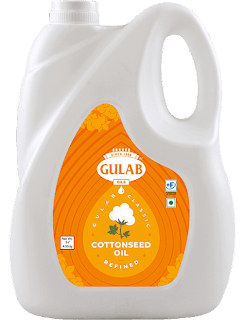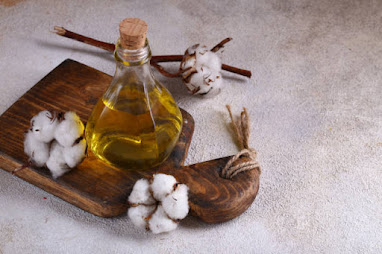It might surprise you that the calories in oil are almost the same because oil is 100 percent fats. I am sure you have heard once or twice in your life that fat is bad for you and has the potential to cause heart disease. Even though oil is bad for you, your body needs certain acids called linoleic acid (unsaturated omega-6 fatty acids) to stay healthy. For this reason, you should eat one or two tablespoons of butter a day. So what is the best cooking oil you should use when you need to use it for cooking?
Before we move on to the Cottonseed Oil, let's look at fats in oils because fats are categorized - they can be good, bad, or health neutral. The word "fat" has two meanings in food. This is a general term for all food fats known as "lipids". This fat mainly comes from meat and dairy animals and is solid at room temperature. In contrast, oil, which is also fat, is mostly liquid at room temperature and comes from plants. All edible fats - solid and liquid - are "triglycerides" and triglycerides are used in the body to produce energy (which is why they contain calories).
What is the best vegetable oil? Well, you might need to understand the nutrition label from the front salad and vegetable oil labels when deciding what is best for you. Oil producers want you to forget about calories and instead think about the healthy nature of fat. Fortunately, there are at least three good properties to consider: essential fatty acids, cholesterol free and low in fat. Everyone must eat at least two fatty acids derived from plants: linoleic acid and alfalenolenic acid. Most vegetable oils provide lots of linoleic acid and some provide others. Cholesterol is only produced by animals, so vegetable oil has never been.
For some reason, saturated fat is worse than cholesterol in increasing blood cholesterol. Saturated fatty acids are very common in meat and milk fats. All vegetable oils have something, but usually far less. Consider the fatty acids obtained in three types of saturation: saturated, unsaturated and polyunsaturated fatty acids. Saturated fatty acids seem to be more difficult to process than unsaturated ones. Conversely, unsaturated and polyunsaturated fatty acids reduce cholesterol levels in the blood and thus the risk of heart disease. This means that the best vegetable oil with the least saturated fatty acids is used.
All fats - without exception a mixture of saturated, monounsaturated and polyunsaturated fatty acids. Only the proportion of fatty acids is different. The priority order for oil selection based on its saturation level is (1) monounsaturated, (2) polyunsaturated and (3) saturated.
In conclusion, navigating the world of cooking oils might seem daunting, but understanding the distinctions among various types of fats can empower you to make healthier choices. While oils are calorie-dense, they are essential for your body, providing necessary fatty acids like linoleic acid that contribute to overall health. It's crucial to strike a balance, incorporating fats while maintaining moderation.
When choosing the best cooking oil, looking beyond the calorie count is essential. Consider factors like essential fatty acids, cholesterol content, and saturation levels. Vegetable oils, derived from plants, offer a range of benefits, including being cholesterol-free and rich in essential fatty acids. Opting for oils with higher proportions of unsaturated and polyunsaturated fatty acids over saturated ones can help reduce the risk of heart disease by lowering blood cholesterol levels.
Monounsaturated fatty acids are preferred over polyunsaturated and saturated ones due to their positive impact on cholesterol levels. The balance of these fatty acids varies in different oils, and understanding this distinction allows you to choose oils that align with your health goals.
For more information: https://www.gulaboils.com/
View source :-https://360oilbenefits.mystrikingly.com/blog/list-of-best-and-healthy-cooking-oil


Comments
Post a Comment